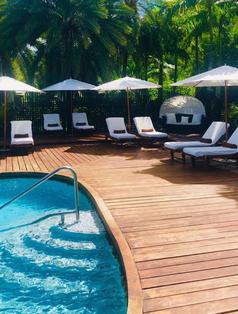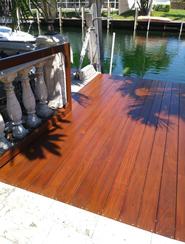

STARTING AT
$ 1.85
LTF.
CALL US NOW!
IPE DECKING SOUTH FLORIDA
Ipe (pronounced ee-pay) also known as Brazilian walnut or Lapacho is one of the densest hardwoods available, with the same fire rating as concrete and steel. It is mildew and decay resistant, and is not deteriorated by insects, making it perfect for outdoor and seaside construction.
Technical information provided by The Wood Database:
Common Name(s): Ipe, Brazilian Walnut, Lapacho
Scientific Name: Handroanthus spp. (H. guayacan, H. serratifolius, etc.)
Distribution: Tropical Americas (Central and South America); also farmed commercially
Tree Size: 100 ft (30 m) tall, 2-3 ft (.6-1.0 m) trunk diameter
Average Dried Weight: 69 lbs/ft3 (1,100 kg/m3)
Specific Gravity (Basic, 12% MC): .91, 1.10
Janka Hardness: 3,510 lbf (15,620 N)
Modulus of Rupture: 25,660 lbf/in2 (177.0 MPa)
Elastic Modulus: 3,200,000 lbf/in2 (22.07 GPa)
Crushing Strength: 13,600 lbf/in2 (93.8 MPa)
Shrinkage: Radial: 5.9%, Tangential: 7.2%, Volumetric: 12.4%, T/R Ratio: 1.2


Color/Appearance: Heartwood can vary in color from a reddish brown, to a more yellowish olive brown, to a dark blackish brown; sometimes with contrasting darker brown/black stripes. In certain species, there are powdery yellow deposits within the wood. Ipe can be difficult to distinguish visually from Cumaru, another dense South American timber, though Ipe tends to be darker, and lacks the subtle yet characteristic vanilla/cinnamon scent while being worked.
Grain/Texture: Has a fine to medium texture, with the grain varying from straight to irregular and/or interlocked.
Here are the reasons Why You Should Buy Ipe from Us.
- Very affordable Ipe Lumber Pricing
- Your order is guaranteed Premium Grade Decking Lumber
- Fast shipping throughout the U.S. & Internationally
- All major credit cards accepted
- Expert & courteous customer service
- No middle men (We own the Sawmills in South America and the distribution warehouse in South Florida)
- All lumber is independently certified and inspected throughout every step of the manufacturing process, guaranteeing the quality of the wood.



Endgrain: Diffuse-porous; solitary and radial multiples; medium to large pores in no specific arrangement, moderately numerous to numerous; tyloses and mineral/gum deposits occasionally present; parenchyma vasicentric, winged, confluent, and marginal; narrow rays, spacing normal.
Rot Resistance: Ipe is among the most durable lumbers on earth, with exceptional resistance to decay, rot, and insect attack. Ipe was reportedly used for the boardwalk along the beach of New York City’s Coney Island, and was said to have lasted 25 years before it needed to be replaced: an amazing lifespan given the amount of traffic and environmental stresses put upon the wood.
Workability: Overall, Ipe is a difficult wood to work, being extremely hard and dense, with high cutting resistance during sawing. Ipe also has a pronounced blunting effect on cutting edges. The wood generally planes smoothly, but the grain can tearout on interlocked areas. Also, Ipe can be difficult to glue properly, and surface preparationprior to gluing is recommended. Straight-grained wood turns well, though the natural powdery yellow deposits can sometimes interfere with polishing or finishing the wood.
Odor: Ipe has a mild scent while being worked.
Allergies/Toxicity: Although severe reactions are quite uncommon, Ipe has been reported to cause skin, eye, and respiratory irritation, as well as other effects such as headaches, asthma-like symptoms, and/or disturbance of vision. See the articles Wood Allergies and Toxicity and Wood Dust Safety for more information.
Pricing/Availability: Ipe should be fairly inexpensive for an imported lumber; prices are usually comparable to other premium domestic hardwoods such as Cherry orWalnut.
Sustainability: This wood species is not listed in the CITES Appendices or on the IUCN Red List of Threatened Species.
Common Uses: Flooring, decking, exterior lumber, veneer, tool handles, and other turned objects.
Comments: Ipe is a wood of extremes: extremely dense and durable, as well as extremely difficult to work. Its incredible hardness and strength make it well suited for flooring applications, though it is referred to as “Brazilian Walnut” among flooring dealers—but it is in not related to the Walnut in the Juglans genus. Ipe has formerly been classified in the Tabebuia genus.
